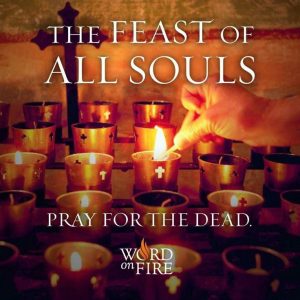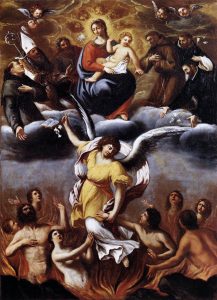The Church and the saints say much about Purgatory and praying for the dead.
In the Catechism of the Catholic Church (1030), the Church states that “all who die in God’s grace and friendship, but still imperfectly purified, are indeed assured of their eternal salvation; but after death they undergo purification, so as to achieve the holiness necessary to enter the joy of heaven”.
The Church gives the name Purgatory to this final purification of the elect. She formulated this doctrine of faith at the Councils of Florence (1439 AD) and Trent 1563 (AD).
This teaching is based on Sacred Scripture. In the Second Book of Maccabees, reference is made to the practice of praying for the dead. In the Book of Revelation, we find that purification is necessary before entry into the Kingdom of God. In the Letter to the Hebrews, holiness is put forward as the requirement for eternal happiness.
“Therefore [Judas Maccabeus] made atonement for the dead, that they might be delivered from their sin.”
2 Maccabees 12:46“Nothing unclean can enter [God’s presence].“
Revelation 21:27“Pursue peace with everyone, and the holiness without which no one will see the Lord.”
Hebrews 12:14
At the hour of death, evil and sinful dispositions may still remain  rooted in the soul. We may also have hidden or unconfessed sin. We must be thoroughly morally cleansed and purified of any imperfections that remained at the point of death.
rooted in the soul. We may also have hidden or unconfessed sin. We must be thoroughly morally cleansed and purified of any imperfections that remained at the point of death.
Although our sins may have been confessed and forgiven, they still have to be sufficiently expiated for, we still have to make up for them, make reparation for them. So Purgatory is both a sign of God’s mercy and His justice.
The suffering of the souls is Purgatory arises from their desire to reach God; they are no longer inclined to anything but Him, but they cannot reach Him until their debt is paid. They also suffer because, on seeing God, they at last see the reality of His love and goodness and the full reality of their sin and offences against that love. The soul, in full clarity, sees what God wanted it to be, the beauty and strength that God meant it to have, the place God intended it to have in His place of salvation. The soul sees clearly and vividly, with complete and perfect illumination, the obstacles it erected, it’s shallow satisfaction, it’s selfishness, the perversions of God’s gifts, the opportunities for graces, the profaning of the Sacraments and the sacred. They now see how that makes them unfit, as yet, to enter into heaven.
The time is Purgatory is relative to what we did or failed to do.
From the beginning, the Church has honoured the memory of the dead and offered prayers above all in the Eucharistic Sacrifice, the Holy Mass. In Purgatory, where divine justice purifies the soul, the burning pain of waiting
can be extinguished by suffrages, that is the prayers and sacrifices of the living, by corporal and spiritual acts of mercy, almsgiving, works of penance.
However, the souls in Purgatory can pray and intercede for us. The saints insist on this:
Carracci’s ‘Purgatory’
“They are unable to pray or merit anything for
themselves yet when they pray for others,
they are heard by God.”
St Alphonsus“If one knew what we may obtain from God
by the intercession of the poor souls,
they would not be so much abandoned.
Let us pray a great deal for them,
they will pray for us.”
St John Mary Vianney
When a Soul enters heaven through our intercession, they will continually pray for us until we, hopefully, join them. We can lessen our time or even avoid purgatory by more frequent attention to our spiritual life, by attending more Masses, through acts of penance and sacrifice and more corporal acts of mercy (almsgiving).
As St John Chrysostom said, “Let us not hesitate to help those who have died and offer our prayers for them”.

Comments are closed, but trackbacks and pingbacks are open.